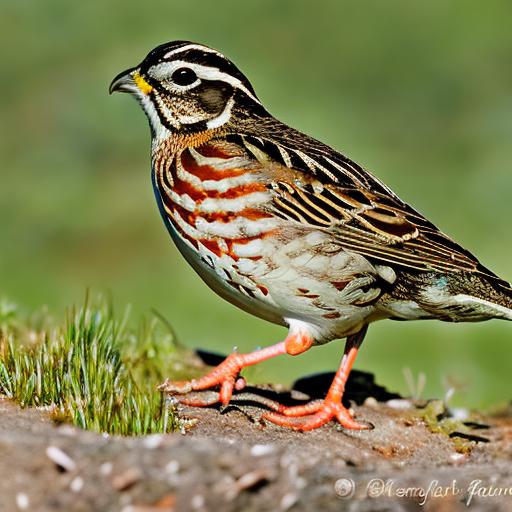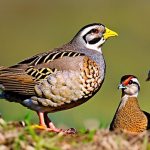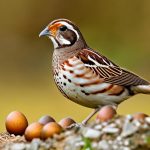In Delaware, there are specific legal requirements for keeping quail that potential quail keepers must be aware of. According to the Delaware Department of Agriculture, anyone who wishes to keep quail must obtain a game bird propagator’s license. This license is necessary for anyone who intends to raise quail for hunting purposes, as well as for those who wish to keep quail for personal or commercial purposes. Additionally, quail keepers must adhere to the regulations set forth by the Delaware Department of Natural Resources and Environmental Control (DNREC) regarding the possession and transportation of game birds. It is important for quail keepers to familiarize themselves with these regulations to ensure that they are in compliance with the law.
Furthermore, quail keepers in Delaware must also be aware of any local zoning ordinances that may impact their ability to keep quail on their property. Some municipalities may have specific regulations regarding the keeping of livestock or game birds, and it is important for quail keepers to research and understand these regulations before establishing a quail operation. By being aware of and adhering to the legal requirements for keeping quail in Delaware, quail keepers can ensure that they are operating within the bounds of the law and avoid any potential legal issues.
Key Takeaways
- Quail keeping in Delaware requires a permit from the Department of Natural Resources and Environmental Control (DNREC).
- The Northern Bobwhite quail is the most suitable species for Delaware’s climate.
- Quail housing should provide at least 1 square foot of space per bird and protection from predators.
- Quail in Delaware should be fed a diet high in protein, such as game bird feed or a mixture of seeds and grains.
- Regular health checks and vaccinations are essential for preventing diseases in quail, with support available from the Delaware Poultry and Small Game Association.
Choosing the Right Quail Species for Delaware’s Climate
When it comes to choosing the right quail species for Delaware’s climate, it is important to consider the specific environmental conditions that quail will be exposed to in the state. Delaware experiences a humid subtropical climate, with hot summers and cold winters. As such, quail keepers should select quail species that are well-suited to these conditions. One popular quail species that is well-adapted to Delaware’s climate is the Northern Bobwhite quail. This species is native to the eastern United States and is known for its ability to thrive in a variety of habitats, including grasslands and agricultural areas. The Northern Bobwhite quail is well-suited to Delaware’s climate and can withstand both the heat of summer and the cold of winter.
Another quail species that may be suitable for Delaware’s climate is the Coturnix quail, also known as the Japanese quail. This species is known for its hardiness and adaptability, making it well-suited to a variety of climates, including Delaware’s humid subtropical climate. Coturnix quail are also known for their rapid growth and high egg production, making them a popular choice for quail keepers who are interested in raising quail for meat and eggs. By selecting quail species that are well-adapted to Delaware’s climate, quail keepers can ensure that their birds will thrive in their new environment.
Housing and Enclosure Requirements for Quail in Delaware
When it comes to housing and enclosure requirements for quail in Delaware, there are several factors that quail keepers must consider to ensure the health and well-being of their birds. Quail require housing that provides protection from predators, as well as shelter from the elements. Additionally, quail housing should be designed to provide adequate ventilation and prevent the buildup of moisture, which can lead to respiratory issues in quail. Quail housing should also be spacious enough to allow for natural behaviors such as dust bathing and foraging.
In terms of enclosure requirements, quail should be provided with a secure outdoor area that allows them to move freely and engage in natural behaviors. This outdoor area should be enclosed with fencing or netting to prevent escape and protect the birds from predators. Additionally, the outdoor area should provide access to natural vegetation and insects, which are important components of a quail’s diet. By providing appropriate housing and enclosure requirements for quail in Delaware, quail keepers can ensure that their birds are safe, healthy, and able to exhibit natural behaviors.
Feeding and Nutrition for Quail in Delaware
Feeding and nutrition are critical aspects of quail care in Delaware, as a well-balanced diet is essential for the health and productivity of quail. Quail require a diet that is high in protein, as well as essential vitamins and minerals. Commercially formulated quail feed is available and is designed to meet the specific nutritional needs of quail. This feed typically contains a high percentage of protein, as well as essential vitamins and minerals such as calcium and phosphorus. In addition to commercial feed, quail can also be supplemented with fresh fruits and vegetables, as well as protein sources such as mealworms or crickets.
It is important for quail keepers in Delaware to monitor their birds’ feeding habits and adjust their diet as needed to ensure that they are receiving adequate nutrition. Additionally, access to clean water is essential for quail health, as dehydration can quickly become a serious issue for these birds. Quail should have access to fresh, clean water at all times, and waterers should be checked regularly to ensure that they are functioning properly. By providing a well-balanced diet and access to clean water, quail keepers can ensure that their birds remain healthy and productive.
Health and Disease Management for Quail in Delaware
Maintaining the health of quail in Delaware is essential for the success of a quail operation, and disease management is an important aspect of quail care. Quail are susceptible to a variety of diseases and health issues, including respiratory infections, parasites, and nutritional deficiencies. It is important for quail keepers to monitor their birds closely for any signs of illness or distress, and to seek veterinary care if necessary. Additionally, preventative measures such as regular cleaning and disinfection of housing and equipment can help reduce the risk of disease transmission among quail.
Quail keepers in Delaware should also be aware of common parasites that can affect quail, such as mites and lice. Regular inspections of birds and housing can help identify any signs of parasitic infestations, allowing for prompt treatment. Additionally, providing a clean and sanitary environment for quail can help reduce the risk of parasitic infestations. By implementing good hygiene practices and monitoring their birds closely, quail keepers can help prevent the spread of disease and ensure the health and well-being of their birds.
Breeding and Raising Quail Chicks in Delaware

Breeding and raising quail chicks in Delaware can be a rewarding endeavor, but it requires careful planning and attention to detail. Quail breeding requires a suitable breeding environment, which should include nesting areas and appropriate lighting conditions to encourage breeding behavior. Once eggs are laid, they should be collected promptly and placed in an incubator set at the appropriate temperature and humidity levels for successful hatching. After hatching, chicks should be provided with a warm brooder environment and access to a high-protein starter feed to support their growth and development.
Raising quail chicks requires careful attention to their nutritional needs, as well as providing a safe and secure environment for them to grow. Chicks should be monitored closely for any signs of illness or distress, and any issues should be addressed promptly to ensure their health and well-being. Additionally, providing appropriate socialization opportunities for chicks can help them develop into healthy and well-adjusted adult birds. By carefully managing the breeding and raising process, quail keepers in Delaware can help ensure the success of their quail operation.
Resources and Support for Quail Keepers in Delaware
Quail keepers in Delaware have access to a variety of resources and support networks to help them succeed in their endeavors. The Delaware Department of Agriculture provides information on obtaining a game bird propagator’s license, as well as resources on best practices for raising game birds in the state. Additionally, the Delaware Department of Natural Resources and Environmental Control (DNREC) offers information on regulations regarding the possession and transportation of game birds in Delaware.
Quail keepers can also benefit from joining local or national poultry or game bird associations, which can provide valuable networking opportunities as well as access to educational resources and support from experienced quail keepers. Online forums and social media groups dedicated to poultry keeping can also provide a wealth of information and support for quail keepers in Delaware. By taking advantage of these resources and support networks, quail keepers can gain valuable knowledge and guidance to help them succeed in their quail keeping endeavors in Delaware.
If you’re interested in keeping quail in Delaware, you may also want to check out Poultry Wizard’s article on the benefits of using a SnapLock chicken coop. This informative piece discusses the advantages of using a SnapLock coop for raising chickens and other poultry, which could also be applicable to keeping quail. It provides valuable insights into the features and benefits of this type of coop, offering practical tips for creating a suitable environment for your birds.
FAQs
What are the regulations for keeping quail in Delaware?
In Delaware, individuals are required to obtain a game bird permit from the Delaware Department of Natural Resources and Environmental Control (DNREC) in order to keep quail. The permit is necessary for both raising quail for personal use and for selling quail or their eggs.
What are the housing requirements for keeping quail in Delaware?
Quail in Delaware must be kept in a secure enclosure that provides protection from predators and the elements. The enclosure should also allow for adequate space for the quail to move around and access to food and water.
What are the feeding and care requirements for quail in Delaware?
Quail in Delaware should be provided with a balanced diet that includes commercial game bird feed, as well as access to grit and clean water. Additionally, quail should be monitored for signs of illness and provided with appropriate veterinary care when needed.
Are there any specific health or disease regulations for keeping quail in Delaware?
Owners of quail in Delaware are required to comply with state regulations regarding the prevention and control of avian diseases. This includes reporting any suspected cases of disease to the DNREC and following biosecurity measures to prevent the spread of illness.
Can quail be kept for hunting purposes in Delaware?
In Delaware, quail can be kept for hunting purposes with the appropriate permits and licenses. Hunters must adhere to the state’s hunting regulations, including bag limits and hunting seasons, when pursuing quail.
Meet Walter, the feathered-friend fanatic of Florida! Nestled in the sunshine state, Walter struts through life with his feathered companions, clucking his way to happiness. With a coop that’s fancier than a five-star hotel, he’s the Don Juan of the chicken world. When he’s not teaching his hens to do the cha-cha, you’ll find him in a heated debate with his prized rooster, Sir Clucks-a-Lot. Walter’s poultry passion is no yolk; he’s the sunny-side-up guy you never knew you needed in your flock of friends!







